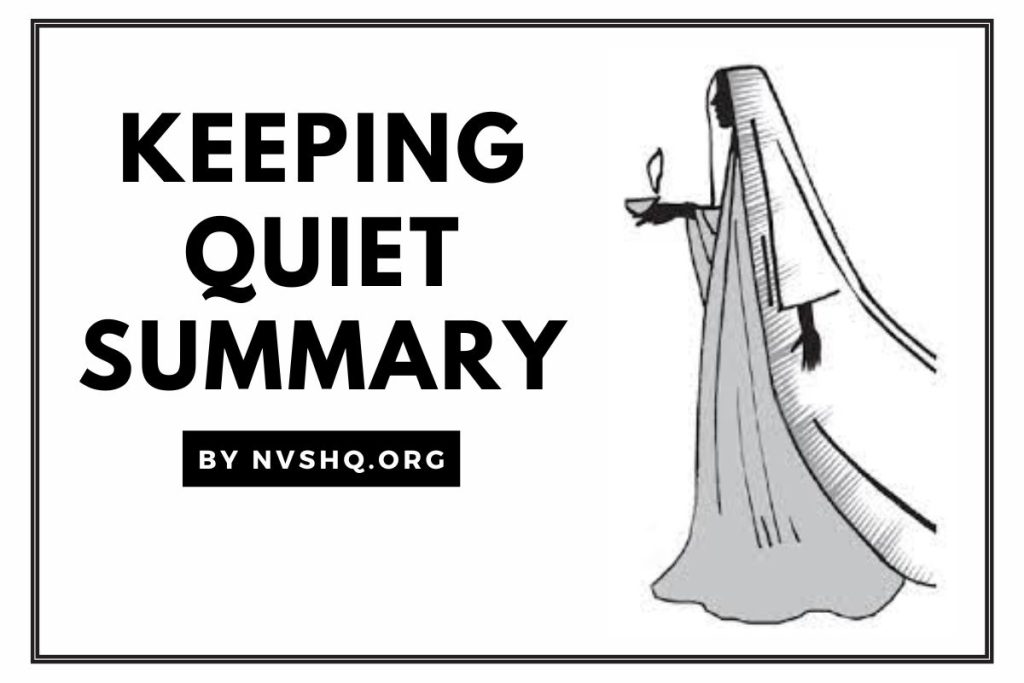Keeping Quiet Summary Class 12 English: In this article, we have provided a summary of Keeping Quiet class 12 English.

Keeping Quiet Summary Class 12 English
“Keeping Quiet” is a contemplative poem written by Pablo Neruda. Through this poem, the poet explores three themes. The first one is peace and unity that is people should live in peace and there should be unity among them. Second is the message of mutual understanding that is if someone has hurt us then we should understand the intention of their actions first. The third one is introspection that’s when one sits down and examine his or her action and analyse them. Poet wants us to do a self-analysis.
The poem begins with the speaker inviting the reader to “now we will count to twelve / and we will all keep still.” This opening line sets the tone for the rest of the poem, as the poet encourages the reader to engage in a moment of quiet reflection and self-introspection. Twelve reflects the hour of the clock or months or the zodiac sign. The act of counting to twelve is symbolic of the need for order and structure, while the act of keeping still represents the need for introspection and contemplation. The poet says that this will happen once on the earth we should be still and not speak anything.
The poem encourages the reader to take a moment to pause and reflect on the world around them. The poem begins by suggesting that one should stop all movement and noise for one minute in order to appreciate the world truly. The poet through the use of the word ‘arms’ represent weapons that we should stop for a while and stop all the fighting. The poet further says that this feeling will be very exotic and very unfamiliar. Neruda says that all this will be very strange for all of us as we humans are not very habitual of this strange quietness.
This highlights the importance of silence and contemplation in a world full of noise and chaos. This period of stillness allows the reader to be fully present at the moment and to experience the world around them with greater clarity. Neruda presents us with examples that we are not doing anything and will only analyse our actions then we will release many things like fishermen in the cold sea would not harm whales. And we are so busy in our that we forget how much harm we are giving our bodies.
Neruda goes on to talk about the war of two types first one being the green war which humans are doing with the environment by destroying it completely and the second one which humans fight with each other. Neruda invites his readers to pause and reflect on their actions, to become aware of the world around them, and to consider the impact of their choices on the environment and on others.
Neruda then goes on to describe the natural world and how it can serve as a reminder of our interconnectedness. The trees, birds, and mountains all exist in harmony and are part of a larger system. This serves as a metaphor for human relationships and how we can learn to live in harmony with each other. The victory is there but no survival is there to celebrate the victory.
Neruda asks the readers to wear clean clothes which represent a new beginning in our life by forgetting the enemies among us. We should think of them as brothers. What the poet wants should not be confused with no activity but life is will go on. He does not want death-like silence but asks us to take a small break and pause from our busy life schedule to analyse each other and appreciate each other.
The poet says that we are just walking behind a goal which is a good thing but says that we are so consumed in this thing that to achieve these goals we have forgotten how to live our life. By taking the time to listen and reflect, we can become more aware of the impact of our actions on the world around us. We ourselves do not understand each other and require to sit down for a minute and understand each other. We have given ourselves a deadline.
We should take the example from our earth. Season changes day and night changes. These pauses or breaks we should learn from earth. And lastly, he says that he will again count up to twelve and he is leaving the readers with the thought of how important mutual understanding and introspection is important. Neruda suggests that if we can all take a moment to be still and listen to each other, then we can work towards a more peaceful and harmonious world. He implores the reader to take this message and spread it to others.






